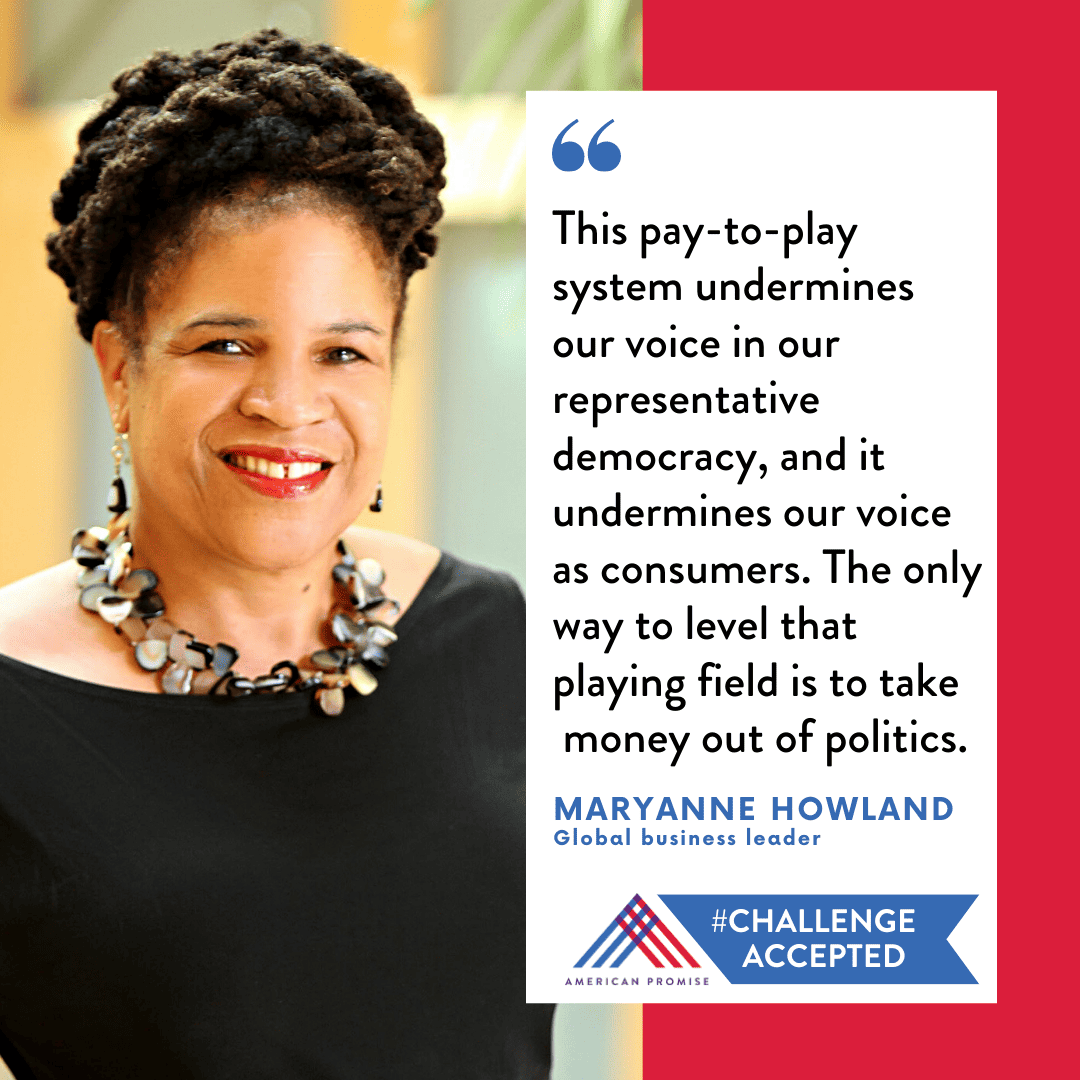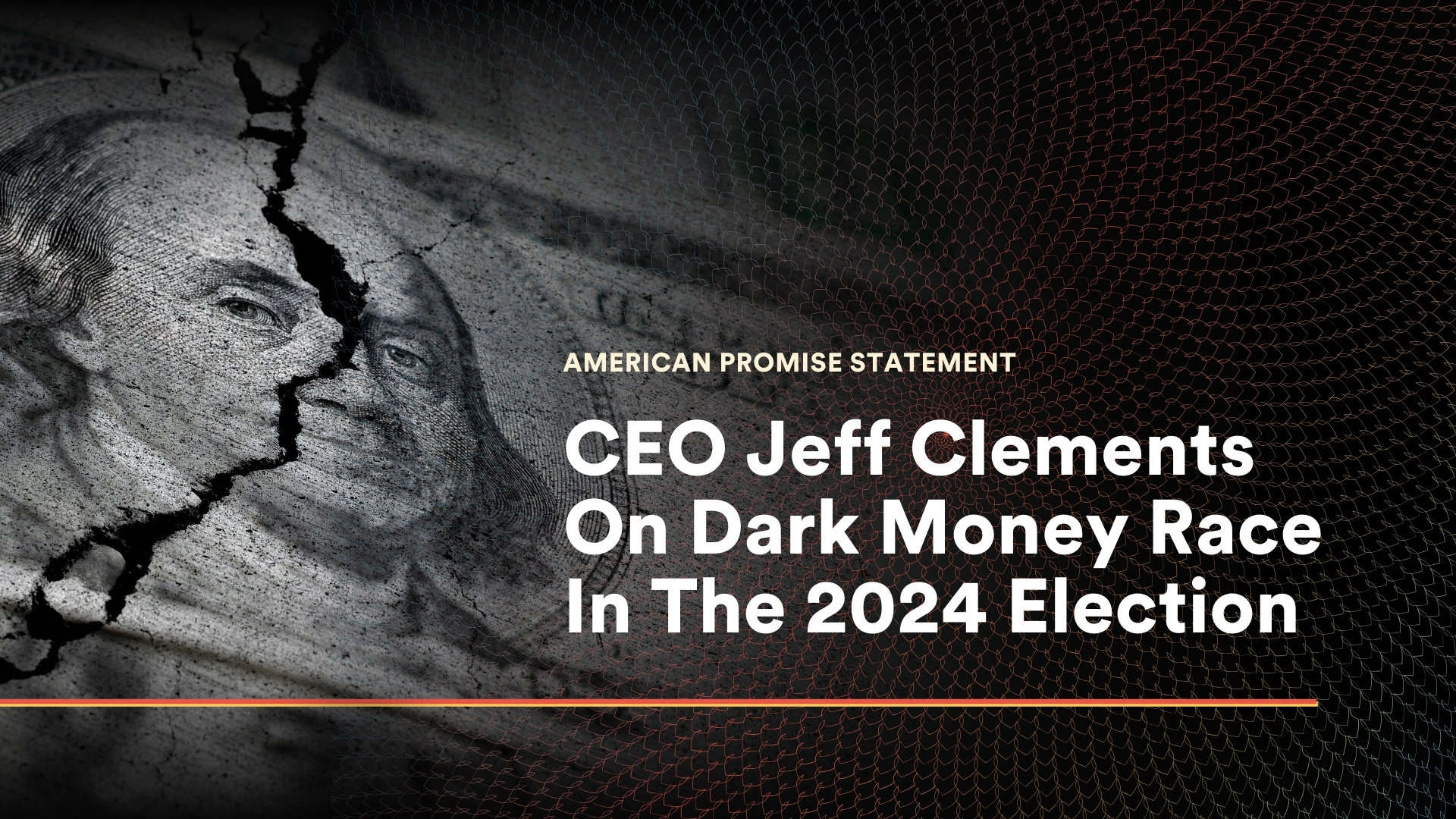Global business leader MaryAnne Howland has dedicated her career to furthering racial and economic justice. As a signer of the American Promise Statement of Principle for Business Professionals, MaryAnne shares her thoughts on the systems changes we need, including ending big money in politics, to build a more just and compassionate economy.
MaryAnne Howland is a global business leader dedicated to advancing a more just, equitable and sustainable economy. As Founder and CEO of Global Diversity Leadership Exchange, MaryAnne is the visionary executive producer of a forum designed to advance the mission and purpose of inclusive and global sustainability. She is also the Founder and CEO of Nashville, Tenn.-based Ibis Communications and serves as Vice Chair on the board of the American Sustainable Business Council (ASBC), a D.C.-based advocacy agency dedicated to advancing public policies that ensure a vibrant, just and sustainable economy. MaryAnne is the leader of the ASBC’s Race and Equity Working Group, which recently led a series of virtual town halls designed to engage business leaders on racial equity issues.
Last fall, MaryAnne joined more than 100 fellow business leaders in signing the American Promise Statement of Principle for Business Professionals. When signing, MaryAnne said it is time for “moral leadership within our businesses, our communities and our government.” American Promise recently talked with MaryAnne about the systemic changes needed to further racial and economic justice, and why she believes an amendment to end the era of big money in politics is an important part of that work. This interview has been edited for brevity and clarity.
American Promise: First off, can you share your point of view on what it means to be a sustainable business leader?
MaryAnne Howland: Today the determination of shareholder value needs to include our impact on the environment, on people, and on society. It has to be more holistically about moving toward an economy that’s regenerative, rather than extractive, an economy that is compassionate. Those kinds of metrics need to become a part of the shareholder index—the materials index, as they refer to it in the corporate world—the value of a company.
In our work at ASBC, we define sustainability under three areas of focus: social justice, economic justice, and environmental justice. You need all three in order to be able to create a sustainable economy. An economy cannot be sustainable unless everyone is included in the movement. Nothing’s sustainable if you’re beating up on the environment. Nothing is sustainable if you’ve got folks who are not included in the economy.
ASBC works on shaping policy, influencing policy, aligning the business interests of our members with the people in Congress who are working on those issues. We write op-eds, we go to Capitol Hill and testify and share stories around our experiences as business owners, as it relates to these issues.
AP: Why does ASBC focus on policy?
MH: Policy is the law, right? That precludes how you feel about me. I don’t care if you like me or not, I can’t change that. I can’t change your heart, I can’t change your mind. But what I can do is dictate what the playing field is going to be. We can dictate and lay the groundwork for a level playing field. And it’s my belief that ultimately policy can influence or change attitudes because it demands that we change behavior. Changing behavior can change culture slowly over time. If you are forced to say “good morning” to your neighbor or your co-worker day after day because it’s the policy, or a law, after a while it’s a habit, then it’s an attitude. We need to be on the trajectory of building policy that helps advance a compassionate society and a compassionate economy.
Our recent ASBC Race and Equity virtual town halls have garnered record attendance. One of the things that was amazing about it was not only did we get member businesses and business leaders from around the country, several people who joined were just citizens who understand that policy is important, that policy really undergirds whatever change we’re going to have on a systemic level, and wanted to be involved to help further that work.
AP: Right now we are in a moment of clarity around racial injustice. People around the world are protesting racism in our institutions, especially law enforcement. Why is this something business leaders need to engage with?
MH: It’s time for business leaders to become social activists. We are on the cusp of dramatic change. We are at a pivotal moment and inflection point. You see tens of millions marching in streets all across the country and around the globe. This is a moment when every company is going to be measured: Where were you? Were you on the right side of justice? The right side of history? This is that moment. Companies are going to be held accountable.
All my life, I’ve heard that America is the shining city on the hill. It’s what we’re brought up to think. It’s crystal clear now that there’s so much truth to that—when you see people with Black Lives Matter signs in New Zealand, in the hinterlands of the Himalayas. People around the world are paying attention to what America is doing, and right now we have the chance to live up to that role in how we respond, to prove that a true democracy works. Business leaders can be part of that.
AP: So these are systemic changes we are talking about.
MH: Absolutely, we have to fix the system. From genocide to enslavement, to Jim Crow, to the New Deal, to redlining…every step of the way our system has been about oppression of people of color. Even when people of color have been able to survive and thrive and even overcome, we have been intentionally shut out of the system. One case in point is the destruction of Black Wall Street in Tulsa, Oklahoma. Most people are just learning about the massacre of a community and its businesses. It hasn’t been a part of American history outside of the black community. You had a society that built its own wealth, a circular economy that was healthy and thriving, and then white people bombed it, destroyed it. There’s a community here in Nashville, Tennessee, that had a similar experience. Though people were not murdered in the streets, their businesses were. In the1950s, Jefferson Street was one of the most affluent communities in the country, until the city decided to run a highway smack through the middle of it, which destroyed a thriving business district. To this day, it is still suffering the impacts of the devastation. This is all planned. It’s intentional and it’s racist.
When I think of sustainability, and the work we’re doing at ASBC, it’s looking at all of the multiple layers of inequities and situations and crises that are perpetuated in the current system that need to be resolved by new law, by new policy. The ladder has to be lowered for everybody to be able to climb together.
AP: Right, so policy change is critical to help create and reinforce a level playing field. How do you see this play out in our current democratic system?
MH: Our democracy is not really a democracy. As it exists today, it is an insult to our intelligence. The way the current system is, because your vote is vulnerable, and because of big money and the Electoral College diluting your vote, the only recourse you do have are protests in the street and marches—to use your voice you have to stand up and scream at people.
The reason there’s so much disillusionment and apathy toward voting, the reason only small percentages of Americans vote, is because they don’t believe in the system. That is because we aren’t part of the system. Nobody’s asking us anything. We are not included in the lawmaking but are subject to what is being decided for us, and in many cases, being abused by the impact of extractive and racist legislation. And so I can understand why folks don’t have faith in the system. They believe it’s run by big money and rigged, it’s all preplanned.
Why can we not be part of the conversation? Here is just one idea: When we file tax returns, we should be able to indicate where we want our money to go. For example, I should be able to decide if I want to invest my tax payment in education, or the environment, or infrastructure. You could apportion 10% here, 20% there. In the aggregate, that would tell you exactly how citizens, taxpayers, want the economy to be structured. Then lobbyists would be ineffective on Capitol Hill. If there were any need for them at all, it would be to talk to voters directly on behalf of their clients, to engage with us to win our designation for where we want our money to be spent or invested. But right now the system is set up so those who make policy are buffered from their constituents by big money. They do not depend on their relationships with voters to win the vote, but rather special interest donor-funded, typically mud-slinging, election campaigns.
AP: We need systemic changes to enable people to use their representative power more effectively.
MH: Yes. Policy and law are fundamental to how we do business, how we operate in the world. Voting, and representation, are the tools at the core of our democracy. It is so powerful, it needs to be protected; and it’s why so many are working so hard to repress the vote. We have a Voting Rights Act, and look how it is constantly under attack, being obliterated, not even fully protected by the Supreme Court. The American Promise Amendment needs to become a part of the Constitution, written in stone.
The amendment process is what gives the American people the power to change the ground rules. That’s what we’re battling against, unfair ground rules.
Money in politics is one of many ways black and brown voters are being disenfranchised purposefully. When you tie your representation to the amount of dollars you have, when money is protected as a form of speech, and then you have economic injustice, where one group of people has been purposefully made to have less economic power, you have now used that tie of economic power and representation to further disenfranchise people.
And that also relates to the economy, the free market, and our power as consumers. The way the system works now is that whatever administration is in power picks economic winners and losers, rather than letting consumers or the free market decide. If companies can use concentrated wealth to buy policies, to give themselves an unfair advantage, that undermines our consumer choice as well. Big corporations are able to use their power to dominate the marketplace and kill small businesses who cannot compete. This has become abundantly clear with the effects of COVID-19. Big companies are being bailed out under the cloak of a Treasury that refuses to disclose how taxpayer dollars are being used to give the big win to corporate donors. This pay-to-play system undermines our voice in our representative democracy, and it undermines our voice as consumers, as well.
AP: So how should we address that?
MH: The best way to level that playing field is to take big money out of politics. It’s a must. The system has to be fundamentally fixed to equalize our voices so that everyone gets an equal vote. And what that would do, too, is make it so suddenly lobbyists no longer have the job of lobbying with money on Capitol Hill. Politicians would have to speak to us directly to explain their stance on an issue, to convince us as voters and as citizens why a particular piece of legislation made sense. Right now there’s all this gaming going on in the system around what gets passed, what gets enacted, what gets pushed and what is shelved.
We have an opportunity now to really go deep and make some fundamental change in our democracy in order to get us to where we need to go and tackle these issues. The momentum is now for the kind of dramatic change that we know this country needs. This is our moment. It’s time to reset, reimagine and restart, to emerge from this crisis in a different kind of way.
AP: Thank you for your time, MaryAnne. One last question: If business people want to lead on these systemic issues, what steps would you suggest they take right now?
MH: Sure. Three big things come to mind:
- Address inequality in your business practices. This is a solution for building a stronger economy and a stronger business. In a multicultural world and a global marketplace, inclusion is a market opportunity. The most successful companies know that. If you’re going to address inequity, you’ve got to understand it. For people who have been operating a “business as usual,” there probably needs to be some education. Take a look within your own company and be honest about who’s not at the table. If you want to access talent in a different kind of way, then you’re going to have to broaden the conversation and think differently about what values you’re looking for inside your workforce. Every company that’s serious about this needs a board seat specifically for diversity governance. Also reconsider your supply chain. Revisit and rethink priorities, processes and ways of doing business, because working in the current way is what has gotten us here.
- Encourage people of color to run for office, invest in their campaigns, support them, and help them win. That’s something we can do right now, as there are primaries everywhere. We’re seeing different people who have different voices, and new ideas are winning.
- As a woman and a minority-owned business owner myself, I encourage all business leaders, especially every black and brown business professional and owner, to sign on to American Promise Statement of Principle for Business Professionals. This could be one of the best ideas of the 21st century that will help us move forward into an inclusive economy that works for all of us.






